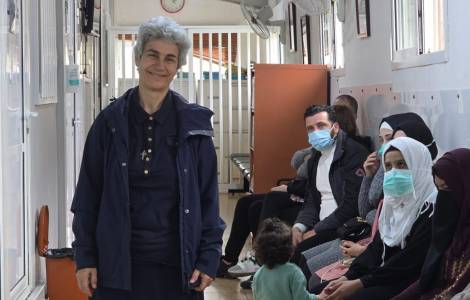We go out in the morning without knowing if we will return in the evening. And this is our daily reality.” This is how Sister Hanane Youssef describes her daily life today in Beirut. With her sisters from Our Lady of Charity of the Good Shepherd, she continues to run the “Saint Antoine” health center in the heart of Rouaysset, a working-class neighborhood in Metn. Degraded buildings, tangled electrical wires, rickety alleys.
No “sensitive targets,” no armed garrisons. But it is a neighborhood where mainly Shiites live.
The sisters have been running the center dedicated to Saint Anthony since 2005. But the activity has existed since 1985, when Lebanon was still in the grip of the civil war. “The crises, one after the other, do not leave us in peace”, Sister Hanane tells Fides. “We are emerging from years of economic turmoil. We have gone from emergencies such as the shortage of medicines and money to a shortage of medical personnel, essential to guarantee our services. Primary care centers like ours play a vital role in the health response, issuing prescriptions and carrying out the necessary tests to relieve the overload of hospitals, which now, with the military attacks, must cope with those who arrive with serious and disabling injuries, limbs to be amputated and disfigured faces and eyes”.
At the moment, adds the nun, on mission for 35 years, there is a shortage of health personnel, not only because of the many doctors and nurses who have emigrated, but also because people are afraid to come to work, given that they are in this neighborhood and therefore more exposed to the current war scenario. This is why we cannot guarantee our services and our social work”.
The Center has always benefited from the help of many young doctors thanks to various agreements with local universities. In recent years, the “brain drain” has affected all categories.
According to the Lebanese Ministry of Health, Israeli attacks in Lebanon since October 7, 2023 have left nearly 3,500 dead and nearly 15,000 injured. The number of displaced people stands at more than 1.2 million according to the UNHCR. A humanitarian catastrophe that destabilizes the minds and souls of a growing number of people. The hospitals, which are collapsing, must cope with the emergency of a growing number of patients suffering from psychological trauma.
“During the 2006 war, we mobilized to vaccinate newborns from displaced communities. Even today, we have become a refuge not only for those who live here, but also for all the displaced families who have been welcomed by their relatives in the neighborhood.”
The work of the Center, Sister Hanane emphasizes, has always been a spontaneous and real sign of Lebanese coexistence between the different religious communities and immigrants. A coexistence that the war puts to the test, by fueling mistrust and fear in hearts.
In the current war in Lebanon, the Sister emphasizes, the attacks mainly target a specific community, the Shiites. Precisely the community most helped by the Saint-Antoine Center. This increases the tension and reveals open divisions, resentments. “Continuing peaceful coexistence is not easy. But we try to continue on this path. We care a lot about it.”
“We continue, thanks to God and with his grace,” repeats Sister Hanane. And she confides: “I was born and raised in the South. I myself was displaced in 1982, when I fled with my family during the invasion, in the middle of the night. I therefore have a particular empathy for those who are living the same experience. The war has marked my personal life, as well as my religious life. It is easy for me to recognize the face of God in the people who are next to me, those whom God sends me every day, including some doctors, historic friends and faithful. I tell myself every morning that if I am in this place, it is because I am called to live the gift of my life. The Lord will protect us and a better day will come.” She repeats the words she has heard so many times from the mouth of Pope Francis: all wars are failures. They are defeats for everyone.
by Pascale Rizk / fides






